The Polarised City (1): How 2 Jos Communities Struggle To Unite After Years Of Crises
Since the first major crises in 2001, Jos, once known for being a tourist attraction, has remained polarised along ethnic and religious lines. This first part of a series focuses on two settlements, Unguwar Mai Damisa and Balakazai, and their journey to oneness.

Life was good for Mary Monday until she lost her husband in 2008, her home in 2010, and her son in 2019.
Mallam Sheriff Aminu, an Islamic teacher, also had reason to thank God. Then his house was destroyed again, and again, and again.
Both live in Unguwar Balakazai and Mai Damisa, respectively, two settlements populated by people who regarded the other community members as sworn enemies. And so, it would take a strong community effort and support from a Non-Governmental Organisation (NGO) for relative calm to settle over their stream-linked communities.
Bush of death
Beginning from the 2001 Jos crisis, Unguwar Mai Damisa, now entirely populated by Muslims, and Balakazai, by Christians, went to war. Residents moved houses, Christians to Balakazai, Muslims to Unguwar Mai Damisa, until there was not one of them on the side considered a stronghold of the other faith. With each side populated by those from a different religion, the battle line was drawn.
Anytime there was a crisis in the city, from 2008, 2010, and beyond, the two communities quickly took up arms against each other. When a dead body of a local from any of the two settlements was discovered, they wasted no time in pointing angry fingers across the boundary that separated them.
This boundary was a stream way down a rocky terrain with bushes around it where angry youths from both sides launched attacks and reprisals against their supposed enemies. It resulted in about 150 deaths in 2001, says Aminu, who is currently the youth leader of Unguwar Mai Damisa.
It took years of confrontation for both communities to finally agree to sheathe their swords and clear the bushes to prevent ambushes; Pwakim Jacob Choji, Executive Director, Youth Initiative Against Violence and Human Rights Abuse (YIAVHA), tells HumAngle.
But before some semblance of peace came, lives were lost, houses destroyed, and properties wasted. Today, the parts of Balakazai and Unguwar Mai Damisa closest to the stream is evidence of this. Remains of what used to be people’s homes, now fire-baked bricks, stand in disarray, giving the place some appearance of a ghost town. Down below, closest to the stream, is a small structure that has never been finished because it was continually razed.
But it seemed most community members later decided to drive away the ghosts for good and give peace a chance. This did not come without its challenges.
NGOs were not welcome in these two communities for a few reasons. They came, got information and left, never to be heard of again. So, the communities’ leaders became suspicious because they felt betrayed, especially when they realised that such organisations were making money off their misfortune and smiling at the bank with donor funds.
But this was soon to change.
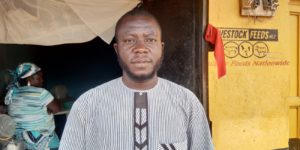
In 2019, the youths insisted they must cross the stream on a reprisal mission against Balakazai. Aminu, who is also a respected Islamic teacher, pushed against that decision. He made it clear that if parties in the conflict went on revenge missions, there would never be peace. No one forgot the significant role he played in quelling the crisis, including residents of Balakazai. It was their path to peace.
So, it was no surprise when Aminu was selected chairman among the youth ambassadors for peace drawn from both settlements. This came after he and several others, like Grace Moses who is women leader in Balakazai, were trained by the Jos Stakeholders for Peace Centre (JSPC) under the NGO Search for Common Ground (SCG) with Jacob Choji as Project Coordinator.
“For a year and a half, they trained us on how to respond during a crisis. We were taught that if we don’t forgive when we are attacked, it would be a vicious circle,” Aminu says. “In the end, we were given ID cards and certificates.”
Mary Monday, who lives on the edge of Balakazai and is one of those closest to the stream, is a typical example of how far the two communities have come in their quest for peace.
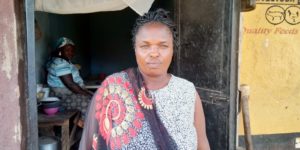
Like Aminu, her house has been burned down multiple times, and she keeps rebuilding. Once, she was a travelling businesswoman who supplied yams wholesale. “I used to make as much as N100,000 in a day,” she tells HumAngle.
Things began to change for the worse when her husband, a butcher, was killed in the 2008 Jos crisis.
Then in 2010, their flat and boys’ quarters were destroyed. Monday remembers running for her life with her two youngest children, aged 10 and 14. The other two, aged 20 and 17, were not home at the time. “I spread one of my wrappers and covered them with the other,” she narrates. “That was how we slept on a rock that night.”
Little did she know that her troubles were not over. In 2019, at the height of the peace process between the two settlements, her 24-year-old son, who worked at a printing shop, went out and never returned.
The person responsible for the crime made no secret of it, Aminu and Monday said. After committing the crime, he had approached the young man’s younger sister and showed her the knife he used. Long after that, he passed their house and taunted the mother by asking after her son.
“He was later shot when there was a confrontation between a gang and security agents,” Aminu says. “If it were before our peace campaign, it would have caused a crisis between the two communities because the boy is a Muslim. We don’t know today whether he is alive or dead.”
Monday used the same zinc roofing from her burnt home and, with the help of the two communities, rebuilt her house. “I decided that I will rather die in my house where I lost a lot. I don’t have the money to rent a home,” she says. “I was not happy when I heard that the boy who killed my son was shot. Wherever he is now, if we meet, I can offer him food to eat.”
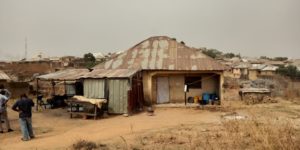
Today, at the stream that separates the two communities, girls and women from both sides gather to do their laundry. Some climb up the valley into Balakazai, a move that residents say used to be suicidal. In the Balakazai marketplace, they trade together like they have never been divided.
Despite these positive developments, the settlements remain separate Muslim, Christian communities, which means that true reconciliation and re-integration are still far from sight.
“Losing loved ones and property is not what people forget easily,” Patrick Emmanuel, a resident of Balakazai for 14 years, says. “We still tread with caution for fear of a repetition of violence.”
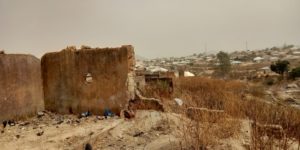
But Bala Yamset, another resident, is more optimistic and says there is a lot to be grateful for because people from both communities now cross over and interact.
Grace Moses, Women Leader in Unguwar Balakazai, however, points out that the road to true peace is when the government empowers the youth in the settlements. “We need skills acquisition centres to take them away from crime,” she says.
Aminu recalls a discussion during the reconciliation process, with a young man who told him he used to be good at making shoes. Unfortunately, he lost a hand during the violence.
“When we gathered some of them and gave them tea with milk, there were those who said they had not tasted milk in a very long time,” Aminu explains. “Lack is what drives many to this kind of violence, so there is a need to provide an environment for them to thrive.”
Storytelling as tool for change
Choji, Executive Director, YIAVHA, points out that the Jos crises met the NGO when it was young. Growing up in the city, he recalls years of peace when different ethnic groups such as the Afizere and Berom lived in harmony with the Hausa without religious discrimination.
Many years later, moved by the spate of violence and feeling the need to go beyond activism, he decided to be part of the solution. “I felt not much was being done,” Choji says. “I saw how donor funds were given, how CEOs used those platforms like it was for their personal enrichment and the work was done without results.”
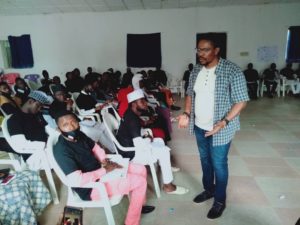
Again, Choji saw that young people were not considered in the scheme of things. “At dialogue tables, you are most likely not going to see young people. When they are there, they don’t talk, and when they do it’s like it has been premeditated or they were told what to say. Yet, they are usually the ones who go to the bushes and do the killings.”
So, in 2020, YIAVHA designed an intervention programme called Faith Plus, where elderly people narrate to the young positive stories about how Jos was before the violence.
The effort involved pairing communities that have had a history of conflicts, especially along ethno-religious lines. Participants had the opportunity to visit communities they migrated from due to the segregated settlement pattern that ensued in Jos soon after the 2001 crisis.
“With this method, we are likely to have a change of ideas and orientation,” Choji says.
A lot of discoveries came out of the programme. For instance, they learned that in the past some people actually gave out lands free but now there is suspicion that the next person would dominate.
One of the storytellers, Sani Lenge, says he wanted young people to understand how life was before now.
“We learnt so much from our elders. We wouldn’t have heard what we were told because we have never cared to ask them to tell us the stories,” a beneficiary, Usman Ibrahim, says.
Luka Aguda, another beneficiary, admits the experience was strange from the beginning, but that it proved interesting to him.
There was also the Plurality Intervention which focused on the University of Jos. It involved storytelling as a tool for changing the narrative of young people. However, YIAVHA had the challenge of how to go further with its programmes. After having these conversations, how do they bring the youth together?
The NGO discovered that the young are only a by-product of the conflict and that the real problem is the elders. “And because the stories are not properly told, you see a situation where it is the Hausa/Fulani versus the others narrative,” Choji explains. “There is also that of the Berom, Anaguta, and Afizere, an issue that needs to be addressed.”
One daunting problem is when a single community has two ward heads from different ethnic groups. This impacts negatively on crime-fighting where each chief seeks loyalty. After all, he who has more following becomes recognised as the legitimate leader.
“When you go to a Muslim community, you see that a particular chief was instituted by another chief. Or, yes, you are a legitimate chief but we have our own Hausa/Fulani representative,” Choji says. “If something goes wrong, there is the problem of who to hold responsible. So, polarisation begins from there, and this places the young people at the centre. A young Berom boy grows with the mentality that an Afizere man wants to take his land and vice versa.”
However, another achievement the NGO has made is expansion in terms of communal relations, where youths get to relate with those from other communities.
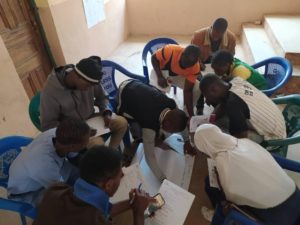
“We learned that when people have a sense of injustice, they tend to react over everything,” Choji says.
The effort has enabled some youth to become leaders who champion interfaith relations.
A typical example of these success stories is that of John Yusuf (not real name) who took up arms during crises in his community. While participating in the initiative, the youth, in a recorded interview, renounced his old ways.
In some communities YIAVHA visited, they discovered that young people were not allowed to make a choice during elections. Instead, they were made to vote based on religious affiliations. “This is what the intergenerational storytelling revealed, where the young get to share their stories,” Choji says. “A lot about what young people go through has not yet been told. We need to hear more of them speak.”
Interventions carried out by the organisation are limited by funding; so they decided to create a youth interfaith ambassador network where the young could champion certain efforts even when donors do not come in.
This is how Aminu and Moses became peace ambassadors under the Jos Stakeholders Initiative led by Choji. They play an important role in mobilising people to hear stories.
To avoid misrepresentation, YIAVHA avoided using the media to amplify its work. Choji notes that due to the sensitive nature of the storytelling initiative, some elders declined to participate, which posed a challenge.
The NGOs Intergenerational Storytelling (IGST) has so far reached about 30 communities. But Jos North remains a challenge because it has about 130 small communities. “If we had more money, we would have expanded,” Choji says. There are also vital places like Pankshin or Compang where there is some tension. Getting what is needed to mentor, organise training to build capacity is a great challenge.
One of the beneficiaries of the IGST, Hafsat Muhammad, says in a video provided by YIAVHA that she learned about how her parents lived in peace with Christian neigbours and how peace reigned.
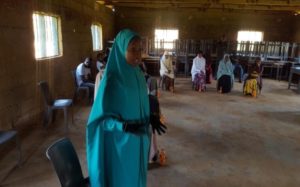
Another recipient of the programme who lives at Shagari shares his positive experience living with Christian neighbours and how much he craves lasting peace in Jos.
Abdul Lawal explains that he realised the value of staying at peace despite differences in religion and that the youth have a vital role to play. He adds that there is a need for more people to hear the stories he was privileged to listen to and points out that schooling is indispensable for youth development.
Several reports have analysed the cause of the crises in Jos and pointed a finger to the struggle for ‘indigene’ rights and political representation.
Although the Police Public Relations Officer (PPRO) of Plateau State, ASP Uba Gabriel, Ogaba says he is unaware of the enmity between Unguwar Mai Damisa and Balakazai, a by-product of the city’s 2001 unrest, HumAngle learned that the Divisional Police Officer (DPO), Nasarawa Division, Musa Hassan, was instrumental in the peace process between the two communities. But Hassan declined comment on the matter until he got clearance from his superiors.
ASP Ogaba, however, points out that there have not been any major religious crises of recent in Jos and the police continues to encourage residents to live in peace.
Support Our Journalism
There are millions of ordinary people affected by conflict in Africa whose stories are missing in the mainstream media. HumAngle is determined to tell those challenging and under-reported stories, hoping that the people impacted by these conflicts will find the safety and security they deserve.
To ensure that we continue to provide public service coverage, we have a small favour to ask you. We want you to be part of our journalistic endeavour by contributing a token to us.
Your donation will further promote a robust, free, and independent media.
Donate HereStay Closer To The Stories That Matter





People making efforts to bring solutions to their common problems. This is highly commendable.